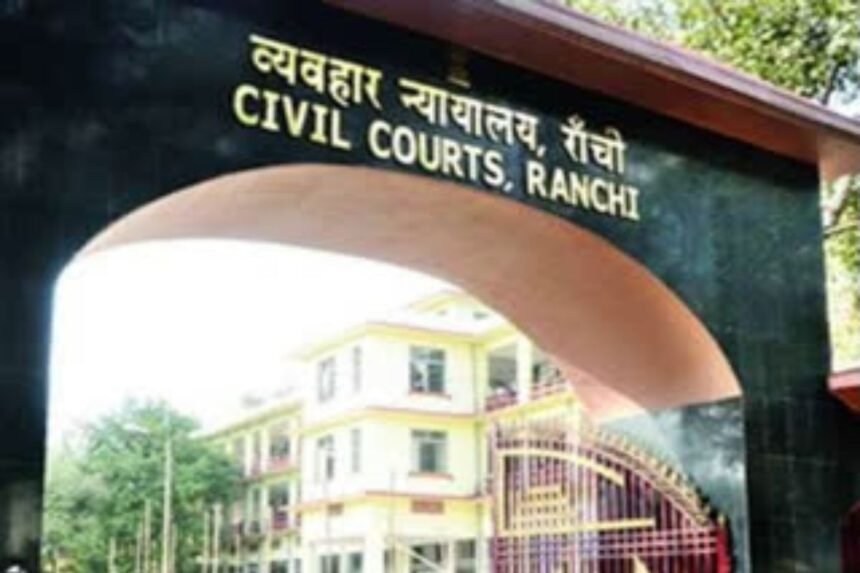Ranchi, October 9, 2024: In a significant development in the ongoing ₹101 crore mid-day meal scam case, the PMLA (Prevention of Money Laundering Act) Court has once again rejected the bail plea of Sanjay Kumar Tiwari, one of the prime accused in the case.
This marks the third time that Sanjay Kumar Tiwari’s bail has been denied by the PMLA court, following earlier rejections by both the Jharkhand High Court and the Supreme Court of India.
The case, which involves misappropriation of funds meant for the mid-day meal scheme in Jharkhand, has garnered widespread attention due to its scale and the involvement of key officials.
The Court’s Decision: Bail Rejected for the Third Time
In its ruling, the PMLA court noted the seriousness of the charges against Tiwari, citing the magnitude of the scam and the failure of the accused to comply with prior legal obligations. According to court documents, Sanjay Kumar Tiwari had previously been granted interim bail by the Supreme Court on the condition that he return the misappropriated funds.
However, he failed to return the money and did not surrender within the stipulated timeframe, leading to his re-arrest.
The court emphasized that granting bail to Sanjay Kumar Tiwari at this stage could hinder the investigation and potentially allow him to tamper with evidence.
Additionally, the court expressed concerns about the risk of flight given the severity of the charges and the amount of money involved in the scam. The prosecution argued that Tiwari’s continued detention is necessary to ensure the integrity of the investigation conducted by the Enforcement Directorate (ED).
Background of the ₹101 Crore Mid-Day Meal Scam
The mid-day meal scheme is a crucial government initiative aimed at providing free meals to schoolchildren in India. The scam, however, uncovered a massive misappropriation of funds in Jharkhand, where ₹101 crore meant for the scheme was allegedly siphoned off by a network of officials and contractors, including Sanjay Kumar Tiwari, Ajay Oraon and Raju Verma.
The scam came to light following an investigation by the Central Bureau of Investigation (CBI) in 2017, which prompted the Enforcement Directorate to file a case under the Prevention of Money Laundering Act in 2021.
According to the ED, the accused individuals, including Tiwari, orchestrated a scheme to divert funds allocated for the mid-day meal program into personal accounts.
These funds were reportedly used to purchase assets and launder money through various shell companies. The ED’s investigation has revealed a complex web of financial transactions, implicating several individuals in the scam.
Sanjay Kumar Tiwari: Previous Legal Proceedings and Bail Denials
Sanjay Kumar Tiwari has made multiple attempts to secure bail over the course of the investigation, but his efforts have been repeatedly thwarted by the courts.
His first bail plea was rejected by the Jharkhand High Court, which cited the gravity of the allegations and the risk of interference with the investigation. Tiwari then approached the Supreme Court, but his plea was once again denied.
In a brief reprieve, the Supreme Court granted Tiwari interim bail, contingent upon his return of the stolen funds. However, Tiwari did not fulfill this condition, leading to his re-arrest by the ED.
This failure to comply with the Supreme Court’s order has significantly weakened his position in court, and his subsequent bail pleas have been consistently denied.
ED’s Investigation and Charges Against Sanjay Kumar Tiwari
The Enforcement Directorate has played a pivotal role in investigating the mid-day meal scam. In 2021, the ED registered a case against Sanjay Kumar Tiwari, Ajay Oraon and Raju Verma under the Prevention of Money Laundering Act (PMLA).
The agency has conducted extensive financial audits and traced the misappropriated funds through a series of complex transactions.
The special PMLA court has already framed charges against the accused, and the trial is ongoing. The ED has presented a substantial amount of evidence linking Tiwari to the scam, including bank records, property documents, and testimonies from witnesses.
The agency has argued that Tiwari was a central figure in the scam, using his position and influence to orchestrate the diversion of funds.
In its charges, the ED has accused Tiwari and his co-conspirators of laundering the stolen funds through real estate investments and fake companies.
The agency is also investigating potential links to other officials and contractors involved in the mid-day meal program, as the scope of the scam appears to extend beyond the individuals currently charged.
Economic Impact and Public Outrage
The ₹101 crore mid-day meal scam has sparked public outrage in Jharkhand and across India. The mid-day meal scheme is a vital social welfare program that provides nutrition to millions of underprivileged children.
The alleged theft of such a significant amount of money from this program has raised concerns about corruption within government schemes and the impact on vulnerable populations.
Economic experts have highlighted the broader implications of such scams on public trust in welfare programs. The diversion of funds intended for schoolchildren not only deprives them of essential nutrition but also undermines the efficacy of the program.
The fallout from the scam has prompted calls for greater oversight and accountability in the administration of welfare programs.
In response to the scam, the Jharkhand government has initiated several anti-corruption measures and enhanced auditing processes for the mid-day meal scheme.
However, critics argue that these steps may not be enough to prevent future fraud, particularly in the absence of structural reforms to address the root causes of corruption in public sector programs.
Conclusion: The Road Ahead for Sanjay Kumar Tiwari
With the PMLA court rejecting his bail plea for the third time, Sanjay Kumar Tiwari remains in judicial custody, facing serious charges of money laundering and corruption. The rejection of his bail signals the court’s determination to ensure that the investigation proceeds without interference.
As the trial continues, Tiwari and his co-accused are expected to face further legal challenges as the ED deepens its investigation into the mid-day meal scam.
The case serves as a stark reminder of the widespread corruption that can plague welfare programs, and it underscores the need for rigorous legal scrutiny to hold accountable those responsible for siphoning off public funds.
For the millions of children relying on the mid-day meal scheme, the resolution of this case will have far-reaching implications for the future of the program and the broader fight against corruption in India.





